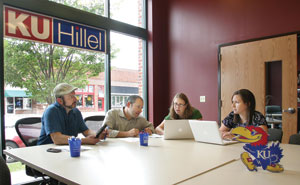 Ten years ago when Jay Lewis took over as executive director of KU Hillel, there were no more than a handful of Jewish students involved in the organization. Today it counts more than 250 students as active members and as many as 750 students were touched by the organization in one way or another during the last school year.
Ten years ago when Jay Lewis took over as executive director of KU Hillel, there were no more than a handful of Jewish students involved in the organization. Today it counts more than 250 students as active members and as many as 750 students were touched by the organization in one way or another during the last school year.
It’s estimated that approximately 1,800 Jewish students attend the University of Kansas. When the fall semester begins Monday, Aug. 22, they can expect another fun-filled year of programming inspired by Lewis’ desire to see KU Hillel continue to grow, thrive and continue to be one of the very best Hillels in the nation.
In an interview last week, Lewis said when he first joined KU Hillel, he wasn’t sure he was going to be there long. It was full of challenges that he and his staff took on immediately. Now he says he truly loves the job and hasn’t found another job that is as challenging and gives him more satisfaction.
This job gives Lewis a chance to blend two of his passions together. The first is his desire to help build a Jewish community and a future for the next generation of Jews. The second is his love for KU.
“As an alum I’m very passionate about the University of Kansas and I bleed crimson and blue. To be able to combine those two passions and be able to make a career out it is pretty awesome,” he said.
Lewis graduated from KU In 1993 and then earned a master’s degree in Jewish Communal Service from the Hornstein Program at Brandeis University. Prior to returning to KU, he was the assistant director of the Bureau of Jewish Education in Orange County, Calif. During his 10 years at KU Hillel, he has been recognized as KU’s Advisor of the Year and received Hillel’s prestigious Richard M. Joel Exemplar of Excellence Award. He commutes to Lawrence from Overland Park where he lives with his wife Kim and his two children.
Susie Greenberg, KU Hillel’s board president, said one reason the organization has become such a success in the last 10 years is Lewis’ leadership. In fact his vision has catapulted KU into becoming a top destination school for Jewish high school seniors.
“Jay is a very competent and charismatic leader, someone you want to hitch your wagon to. Over the past 10 years, his vision for KU Hillel combined with the growing demands of an increasing enrollment of Jewish students has developed into a brand of programming, engagement and tradition, which has become nationally recognized,” she said.
In the beginning A lot has changed at KU Hillel since Lewis took charge. He said that change actually began before he was hired when the Jewish Federation of Greater Kansas City took KU Hillel under its wing. So a Kansas City-based board of directors was formed and more funding was also funneled to the organization through the Federation and the Jewish Community Foundation.
A lot has changed at KU Hillel since Lewis took charge. He said that change actually began before he was hired when the Jewish Federation of Greater Kansas City took KU Hillel under its wing. So a Kansas City-based board of directors was formed and more funding was also funneled to the organization through the Federation and the Jewish Community Foundation.
When he joined KU Hillel, Lewis said one of the first goals was to find out whether students at KU just weren’t serious about Jewish life or whether “the students at KU had never been given anything of quality to really engage them in Jewish life.”
Lewis said they quickly learned it was clearly the second hypothesis. To begin that engagement, the first thing staff focused on was Shabbat programming.
“Every strong Jewish community has Shabbat at the center of it and whatever way, shape or form that Shabbat is recognized or celebrated,” Lewis said.
When Lewis came on board during the summer of 2001, KU Hillel usually had two Shabbat programs each semester. By the end of his first year, the calendar included a weekly Shabbat dinner and service.
One of its most well known and popular programs, Rock Chalk Shabbat, was created in January 2003 as another way to get students to realize there had been a renaissance of Jewish life at KU.
“Our goal was to get 150 Jewish students to come together for a Shabbat dinner. We wanted to blow any preconceptions out of the water,” Lewis said.
For that first event, 165 students attended.
“That was really the symbolic turning point where students and potential students and parents and potential donors and community members really saw that there is potential for Jewish life at KU.”
Building membership
To increase participation, staff chose to focus its efforts on freshmen because they had no preconceived notions of KU Hillel.
“If we did a great job with freshmen for four straight years, we would be able to build our Jewish community,” he said. “We spent a disproportionate amount of time on staff and resources engaging freshmen in Jewish life.”
That strategy worked. But while building participation, Lewis also felt a student leadership structure needed to be developed to keep people interested and engaged.
“The big goal was by the end of the first year we wanted a number of students to feel ownership of the organization. We didn’t want to hear what Hillel needs to do is blank. We wanted to hear what we need to do is blank.”
New digs
Students were happily taking part in programs and the leadership structure had been built. Now KU Hillel needed a place to show it was a real organization. Its home in a “small, old, quaint house on Mississippi Street” needed to be upgraded.
“When I came, the organization functioned more like a small club. We were operating with a very small budget and there was no student leadership structure at all, so the house certainly met our needs at the time,” Lewis said.
In late 2009 KU Hillel moved into new quarters at 722 New Hampshire Street. Many of its programs are held there, including Shabbat services, dinners and erev Rosh Hashanah worship.
“About the maximum we can fit in here is about 100 people, but all of our furniture is on wheels so it is very multi-purpose,” he said. “It’s really become a great engagement tool and destination for Jewish students. The big programs — Bagels and Basketball and Rock Chalk Shabbat — those are done other places,” he said.
Besides having a more comfortable place for staff and volunteers to work and program space, the new offices help KU Hillel make a good impression on visitors.
“When high school students and their parents come through here looking at KU … and they see the space filled with students, they can tell we’re serious about Jewish life here,” Lewis said.
Continuing the momentum
Much of KU Hillel’s success over the last decade can be attributed to Lewis’ drive to always find “a smarter, more efficient way to accomplish our mission.”
“We’ve really created one of the most unique, innovative and most effective models for Jewish campus life in the country because we are constantly in that mode of enhancement and improvement,” he explained.
Over the years the staff has grown from three to five, and now includes a full-time rabbi and a staff member with a master’s degree in social work. Continued success also depends on finding the right mix of volunteers — including what Lewis calls “an amazing mix of parents, alumni and caring community members who truly believe that engaging 18- to 22-year-olds in Jewish life is vital to the future of the Jewish community.”
Lewis plans to work hard to continue maintaining the success KU Hillel has worked hard to achieve.
“We’ve grown very quickly and the budget has more than tripled than when I started. We want to make sure that we can continue to operate at this level and continue to grow to meet the needs of the Jewish students at KU,” Lewis said.
He believes KU Hillel can absolutely continue to grow.
“While we’re really proud of the number of students that we are reaching and the impact we are having on the students that we do reach, we’re still not anywhere close to reaching all of the Jewish students at KU and we really have to continue to strive to figure out how we can increase the breadth of the number of Jewish students we reach and also the depth of the impact we have on them. The stakes are just too high. If we don’t have this kind of impact on these students during these incredibly informative years, we’re not going to have a Jewish community in the future.”


